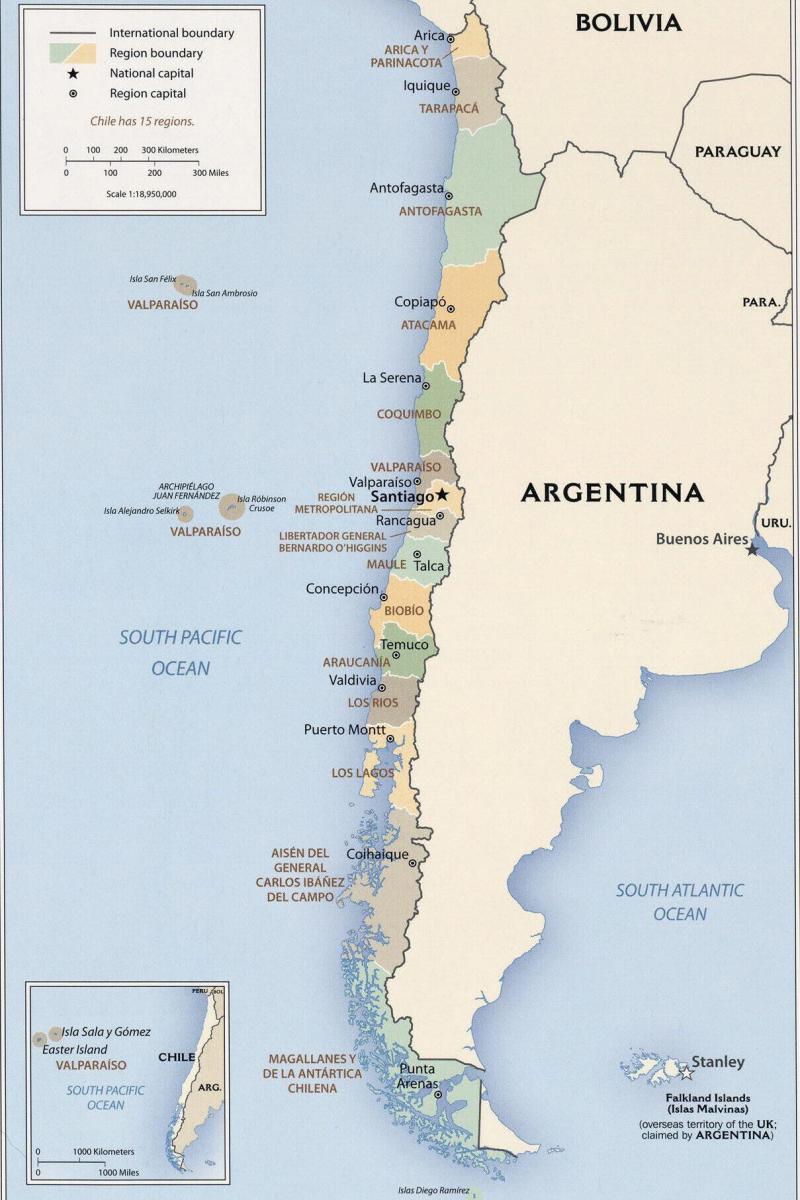Chile is arguably the most oddly shaped country in the world; it’s like a giant stick. Even more odd is that this stick doesn’t need to beat back tourists (at least not yet) as each nodule on it represents a different climate and ecosystem. Plus, Chile’s long, long coastline is the world’s largest swimming pool. (Incidentally, the real one of 1,000 yards also exists there.)

Five major ecosystems from the top of the stick down are the Atacama Desert, the driest non-polar desert where it has never rained in some places and there is almost no light pollution (making it ideal for astrotourism); temperate wine country, cities (Santiago and UNESCO World Heritage City Valparaiso) and ski slopes; the zone of UNESCO-recognized Rapa Nui (Easter Island) with pink sand beaches; southerly forests, lakes and volcanos; and southernmost Torres del Paine, an UNESCO biosphere, and glacier-filled Patagonia. An ambitious hiker can walk across the width Chile, which is only 200 kilometers at its narrowest. Compare that to its length of 6,500 kilometers and you envision the giant stick!
Whoever created the country’s borders must have known something about agriculture. Chile has idyllic crop production conditions with few pests and diseases. In fact, it has a massive winter nursery business for Northern Hemisphere seed producers that want to grow crops year-round. Now you know why you often see “made in Chile” on containers of fruits and vegetables or get great value wines.

A colleague and friend named Juan runs winter nursery service and graciously toured me through his orchards, fields and friends’ wineries when I was in Santiago for a business conference about 15 years ago. His backyard alone was a visual feast with ripe persimmons, grapes, apples and more aplenty. The modest-looking but quality-producing wineries that we visited have surely doubled their volumes since that time.
Chile is the world’s fifth largest exporter of wine, its ninth largest producer and probably number one in terms of value. The country is blessed with excellent wine grapes. Think Carménère, Malbec and other French varietals with a fruitier twist. (Note Carménère originated in France but is rarely grown there anymore.) Such wines came in handy the next time I saw Juan in Santiago.
My friend Christine and I passed through Santiago en route to Antarctica in December 2010. Juan graciously invited us to dinner with his wife at their home. Beforehand, he toured us around the city by car. When we were about 2 miles from his home, we heard “sput, sput, sput … kaput.”
“Oh no!” Juan exclaimed. “We’ve run out of gas! Let me call my wife.”

With all due respect, I had only heard of the reverse gender situation until that point in time. (I can relate first-hand.) This was a moment to call upon statue of the Virgin Mary on San Cristóbal Hill, the city’s second highest mountain, which we visited at sunset. Thankfully, we were not on a major highway, nor far from a gas station but it was around 8 pm.
“Yes, I know,” he said humbly to his wife Jacqueline. “I didn’t see the tank was low. I will send the ladies by taxi and figure out how to get gas in the car.”
When we arrived to meet Jacqueline for the first time, she quickly handed us a glass of Chilean wine.
“I’m so sorry,” she said with a beautiful accent. “Running out of gas was not supposed to be part of the tour!”

“De nada,” we laughed as Christine proceeded to explain the hilarious situation in perfect Spanish. (Little did we know that this was nothing indeed compared to being part of a ship rescue on our Antarctica expedition!)
By the time Juan walked in the door about an hour or so later, both the car and us ladies were fueled. The delightful Carménère had us “cooking with gas.” But poor Juan had run out of gas himself in dealing with petroleum. A kiss from his wife followed by several toasts eventually revived him.
In keeping with a typical Chilean household dinner hour of 10 pm, Juan was not late for dining at all. He just missed the beginning of Happy Hour! Ironically, jet-lagged Christine and I swapped energy levels with him during dinner, barely keeping our eyes open. I remember the Chilean cuisine was delicious, including seafood and I think empanadas, but my foggy state that night – compounded by various Chilean wines – eclipsed further details.
Most importantly, that night in Santiago reminded me that good humor and positivity can turn around most non-life-threatening challenges. (See also my tale of a black-out in Luxembourg.) Good wine helps, too.
As Brazilian novelist Paulo Coelho wrote: “Accept what life offers you and try to drink from every cup. All wines should be tasted; some should only be sipped, but with others, drink the whole bottle.”
At Juan’s place that date, it may have been bottles.
Related
Related Posts
- Exploring Ancient Greece with the God of Wine
In August 2020, a friend and I braved traveling during COVID-19 to escape the red…
- Fire Land, Earth Wine, Sulfur Water and Godly Air in the Caucasus
Noah’s Ark purportedly landed in the Caucasus, a region between the Black and Caspian Seas…
- Unsuspecting Visitors in the South African Bush
Think of South Africa and your mind may first go to wine. But it also…


